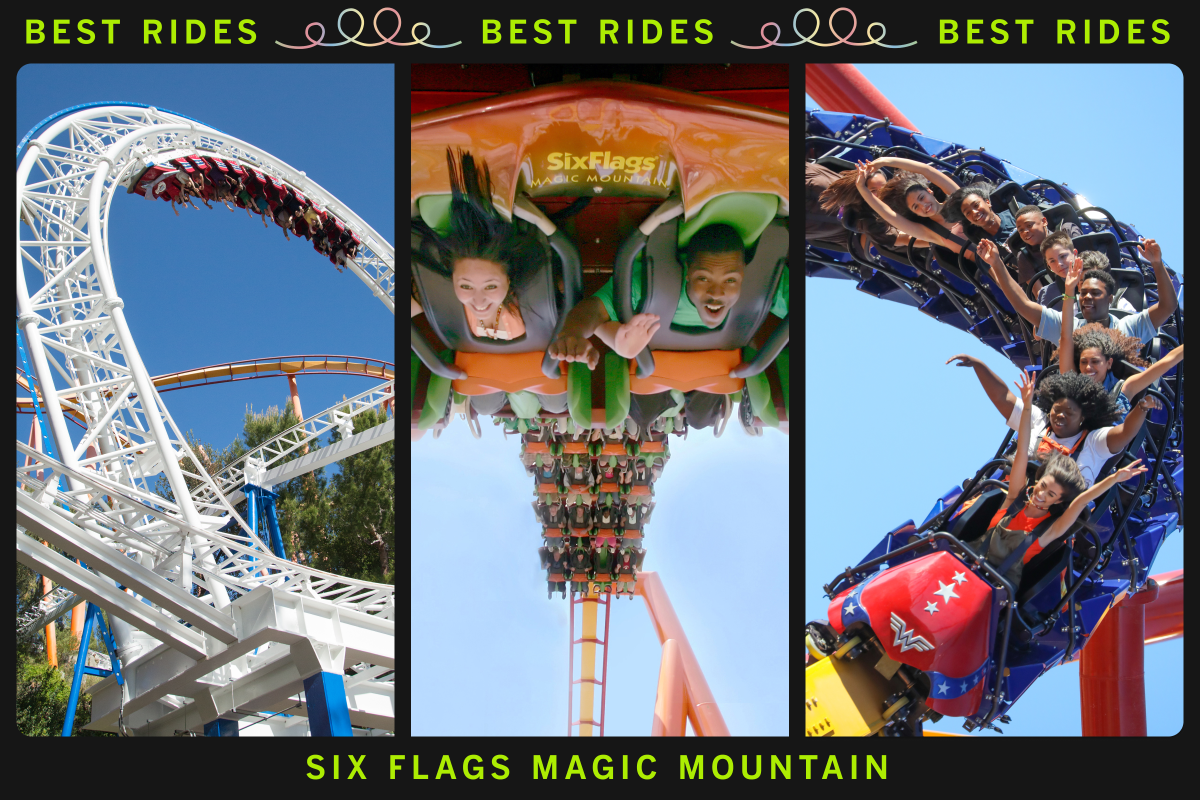
Every thrill ride at Six Flags Magic Mountain, ranked
Six Flags Magic Mountain, in its more than 50 years of existence, has solidified itself as one of the most thrill-packed amusement parks in America.
Its stable of historic and modern coasters is unparalleled, and for connoisseurs of the form, Magic Mountain is cherished for its mix of coaster styles — be it wooden, loop-based, single-rail or ones with mind-confounding seats that rotate 360 degrees. And though Magic Mountain has a large roster of kid-focused and standard amusement park attractions (think bumper cars), Disneyland this is not.
Planning your weekend?
Stay up to date on the best things to do, see and eat in L.A.
As The Times wrote in 1971 when the park opened, Magic Mountain is as different from Disneyland as Los Angeles is from San Francisco. One comes to this Valencia park to be jostled, to be rocketed through air, to be spun upside down and to experience sensations of racing at high speeds through twists, turns and loops.
So here’s a confession: I’m not a thrill-seeking coaster hound. My idea of a good time at a theme park is to slowly luxuriate in the presence of singing pirate robots. I knew I’d get sick if I tried to review the coasters of Magic Mountain by riding them all.
Luckily I had a fallback plan.
Accompanying me to the park was a roller-coaster expert and theme park designer. I relied on Jeremy Thompson, who writes coaster reviews on his website Roller Coaster Philosophy and worked for a decade at theme park design firm Thinkwell, where he contributed to the design of such projects as Warner Bros. World Abu Dhabi. I trusted Thompson to steer me and place these coasters into context.
And while my stomach may not always agree, there’s no denying that Magic Mountain’s coasters are engineering wonders. Here’s a ranking.
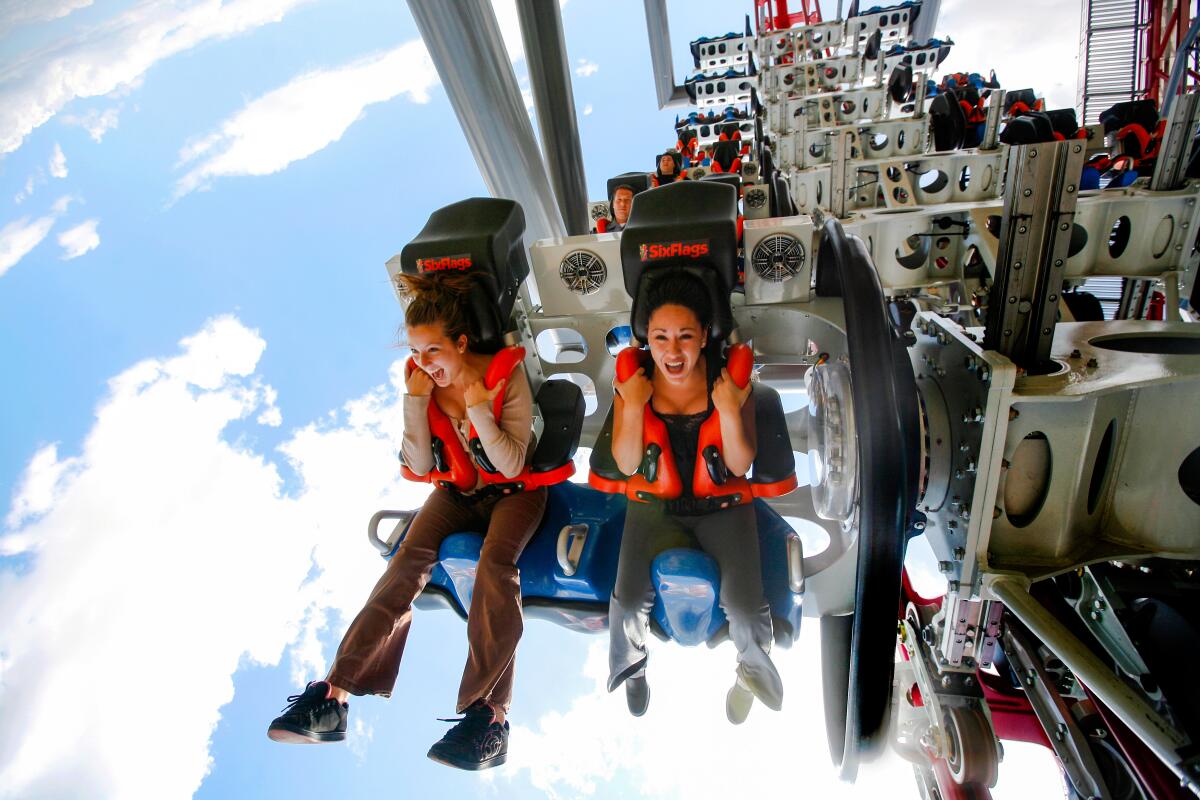
1. X2
Yet you’ll be forgiven for skipping a ride in which seats rotate 360 degrees, forcing riders, at times, into face-first drops. And those rotations don’t stop, giving X2 its reputation for disorienting riders.
The seats extend off the track, giving you a sensation of flight at its most chaotic; with an assortment of loops that suddenly shift direction and segue into drops, X2 aims to keep guests guessing as to where it is heading. Due to the constantly changing direction of the seats, the path of the track can be hard to discern.
“There’s nothing else quite like it in the U.S.,” Thompson says of the coaster that, in its original form, opened in the early 2000s. He praises its stats: “full 360-degree rotating seats on a 20-foot wingspan over 200 feet high with a vertical drop.”
“There’s a moment,” he says, “when you crest the lift and you’re looking straight down 200 feet, and then it flips you upside while you’re plummeting. No matter how many times I’ve gone on it, it always gives me the reaction of, ‘I don’t know if I’m going to make it.’ And then I make it.”
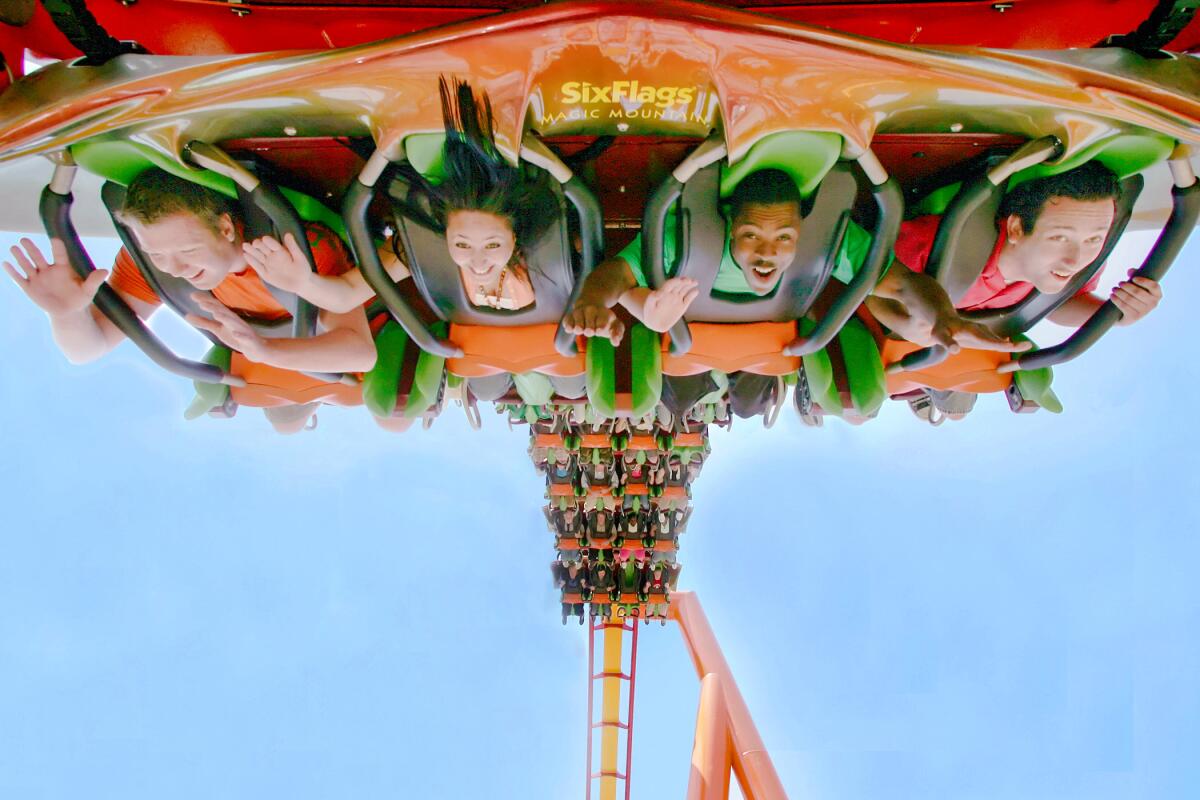
2. Tatsu
But I respect its ambition, and the way that lying face down — the cars shift once riders are bolted in — is designed to simulate the sensation of flight. At one point, riders will experience a zero-gravity roll, which is something I enjoyed hearing our coaster expert discuss but was more than fine to not have lived through.
“So I think Tatsu is the most elegantly designed coaster in the park,” Thompson says. “It captures the sensation of flight like few others do.”
Because of Tatsu’s placement at Magic Mountain, the 170-foot-tall structure actually stands about 263 feet above ground. “It starts off fairly gentle,” Thompson says. “You get a euphoric feeling of flight, but it slowly ramps up until you get to the pretzel roll and then you dive down. It destroys you for a few seconds. And then there’s a heroic spiral high above the midway, and it’s what the dream of flight feels like.”
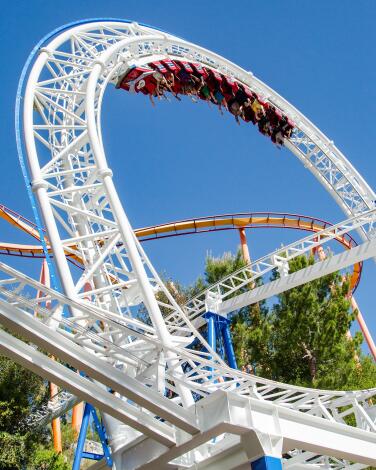
3. The New Revolution
But, situated as it is near the front of the park, it also serves as a sort of an introduction to Magic Mountain thrills, reaching a speed of about 55 mph while boasting multiple ground-hugging curves centered around the centerpiece loop. It also resides in one of the park’s lushest, greenest settings.
“There’s a lot of history behind it,” Thompson says. “But it wasn’t just the first modern looping coaster; they got the design exactly right.”
It’s the pace of the ride that impresses Thompson the most, noting that it builds anticipation for its loop.
“It’s a fairly flawless ride,” Thompson continues. “When you have a vertical loop, and that’s your main selling point, that only lasts a couple seconds, so they gave it a sort of three-act structure. It slowly builds up, and it has the loop in the center and then winds down. You can break it up with rising action, a climax and a denouement. It has a classic structure.”
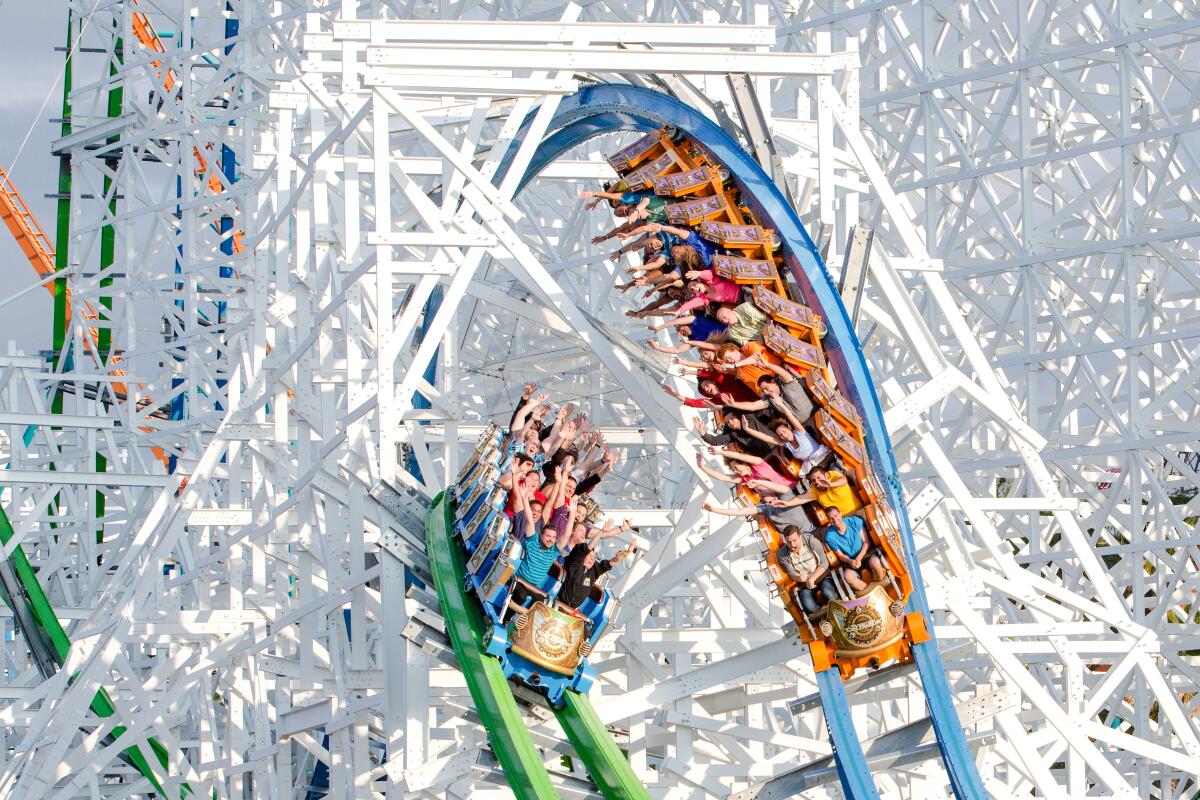
4. Twisted Colossus
If everything aligns correctly, the dual coasters of Twisted Colossus will appear to be racing one another, looking, at times, to be flipping around each other. But that requires some deft timing, and race or not, there’s a mix of elements, including a steep drop and a bevy of rolls, that all result in a coaster that constantly feels buoyant as we repeat each of its elements twice.
“The choreography between the two sides, the way they flip over and on top of one another, it’s a very dynamic ride,” Thompson says. “It’s fun to watch. It’s fun to ride. It’s not the most extreme coaster here, but I think that the fact that you, more or less, get the same experience twice, you get a nice long ride.”
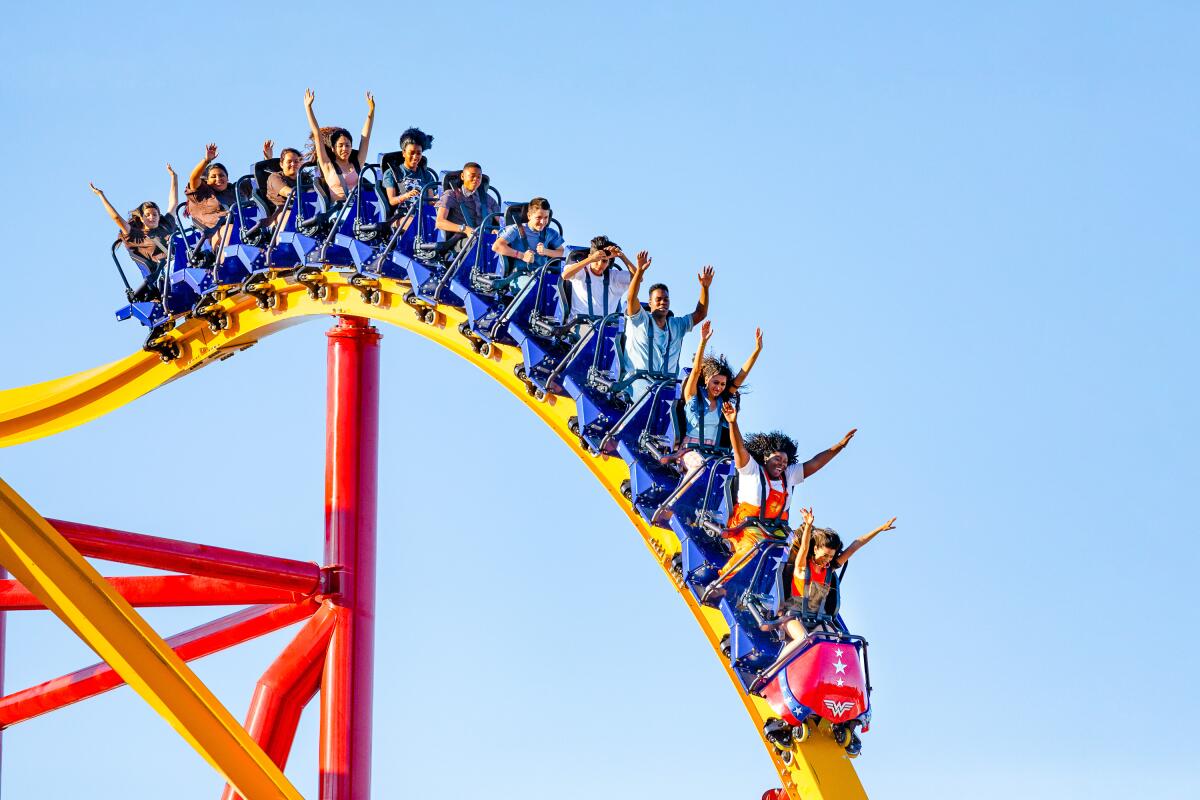
5. Wonder Woman: Flight of Courage
A thin yellow rail situated around red supports, it opened in 2022 as the tallest and longest single-rail coaster. Its spindly structure simply looks fast, and its 3,300-foot-long track contains multiple inversions, including a zero-G roll. The relatively svelte passenger trains seat only 12, but we’ll essentially be straddling the monorail track, leaning forward as we’re propelled down an 87-degree drop.
We’re exposed to the elements here, and this was the coaster that did me in, leaving me hobbling and looking for a restroom after its run. That’s because at 58 miles per hour on a wire-thin rail, Wonder Woman relentlessly shifts into each of its elements with little time to lock eyes onto the track for balance. After the initial lift, there’s little let-up — we’re dropping, we’re upside down, we’re spinning — and as I saw sky and ground swirl around me, I admired the track’s smoothness while resenting its dizzying nature.
I was halfway through completing every coaster at Magic Mountain when I rode Wonder Woman, and I will respect the fact that it bested me and rendered me coaster-less for the rest of the day.
“It’s a very modern coaster by Rocky Mountain Construction, one of the most popular and celebrated manufactures among coaster enthusiasts,” Thompson says. “This one, from the moment you crest the lift into the brake, it’s all killer. There’s no dead spots on it. It’s breathless.”
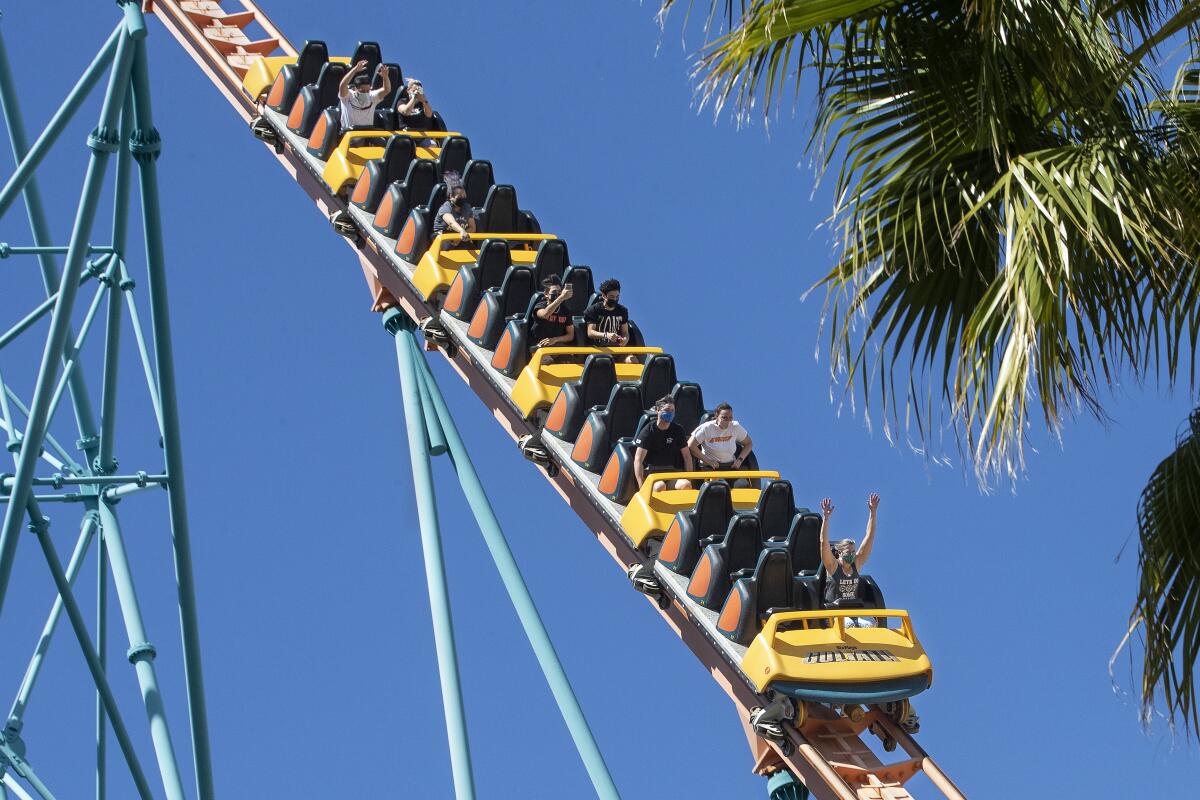
6. Goliath
True to its name, the coaster is massive at 4,500 feet of track. The first lift hill will be terror to anyone with a fear of heights, taking us about 235 feet into the air for a drop that plummets straight into an underground tunnel. That means that first dip is a staggering 255 feet deep. From there Goliath goes straight into another lift — expect some weightlessness — before settling into a second half that is all about speed and tight curves.
“Goliath is the park’s largest roller coaster — it’s its longest,” Thompson says. “Those superlatives by itself earn it a very high placement among a very competitive coaster landscape at Magic Mountain. It’s a very smooth ride. It’s all about speed and height. It’s very comfortable, compared to a lot of coasters that can leave you disoriented.”
In contrast to some other mega-coasters around the globe, Thompson says Goliath packs less airtime. But don’t consider that a major criticism.
“It’s always a good ride. That helix at the end with sustained positive G-forces is pretty crazy,” Thompson says. “You don’t really get that anywhere else.”
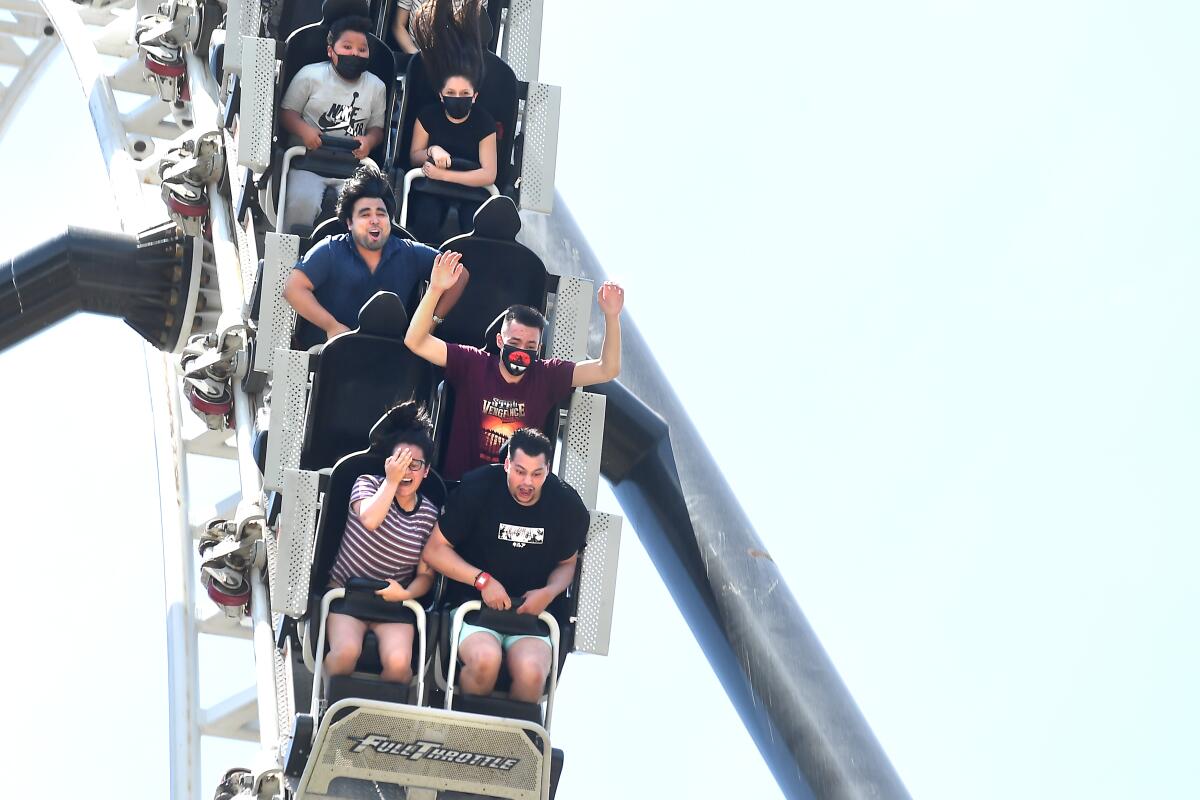
7. Full Throttle
Then the coaster has a change of heart, and sends us forward again into a so-called top hat maneuver — essentially 90 degrees up and 90 degrees down — only now, the track is tracing the outsides of that initial loop. To Thompson, it results in an incredibly clever ride experience, albeit one that ends abruptly.
“It makes the most of every moment that it has,” Thompson says. “That initial launch, [one of] the world’s tallest vertical loops — you’re just hanging at the top — is quite the kick-off. I don’t think any ride in the first five seconds has quite the same impact as Full Throttle. There’s no ramping up.”
To then go back over the top of the loop, says Thompson, is relatively genius design. The only problem? The ride then just — stops.
“Doing the inside and outside of the track that spans the vertical loop is really inventive engineering,” he says. “The biggest downside to it is just its length. You go over that last hill, and you’re literally hitting the brakes at a 90-degree angle. I just need something more. If it could have just gone over the midway and done one more inversion and roundabout to wrap it up, then I think you would have had a complete top-tier ride.”
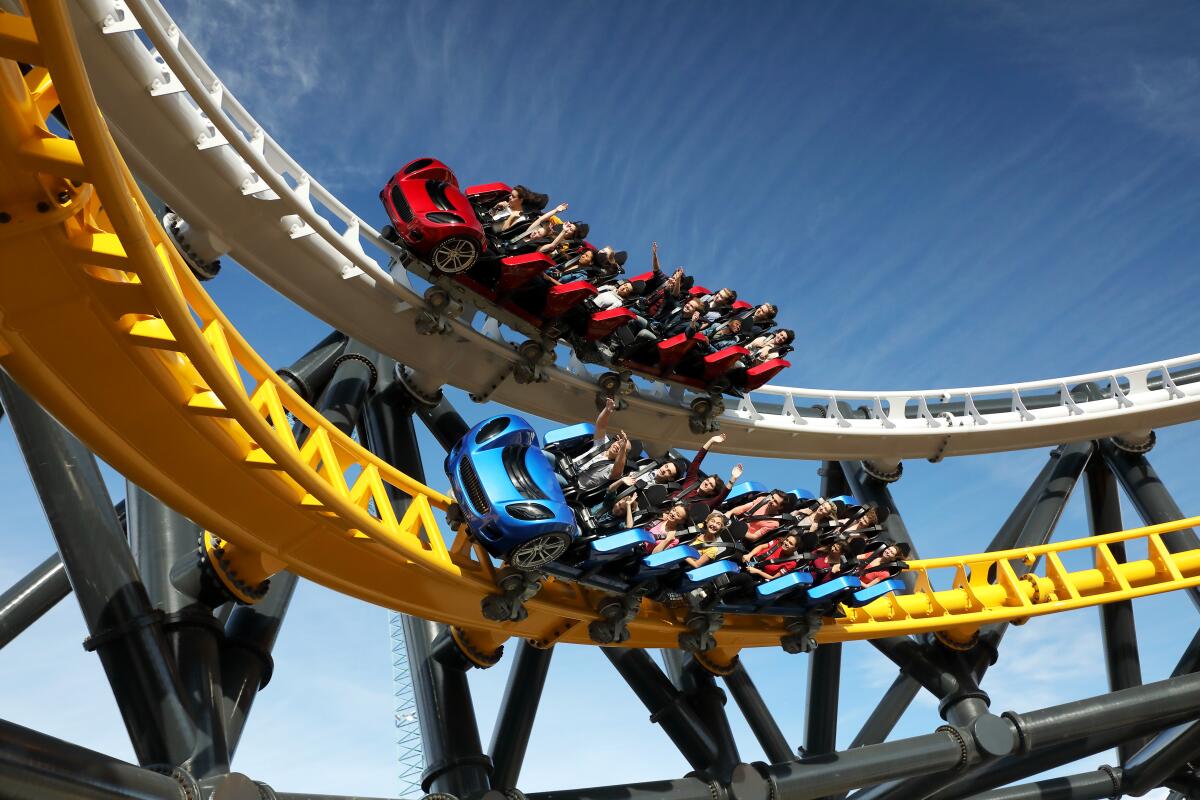
8. West Coast Racers
With no massive drops, this is all about riding side-by-side with another coaster car, where a series of lifts and twists creates the illusion of near-misses and so-called high-five moments, where it almost appears like riders in separate cars can slap palms with one another. It’s one track, smartly designed as a twirling Möbius strip, allowing everyone to experience two “races” on the coaster. A mid-ride pit stop not only gives us a breather, but adds to the vibe; we’re paused in a garage while we’re told automotive work is being done on our ride vehicle.
The ride experience is one of mangled turns, as corkscrews and inversions have the two racing cars seemingly rolling around one another. There’s a surprising amount of airtime, as each dip careens into another element — a roll or just a piece of the track that’s a mess of coils and curves.
“It’s a ride that’s so nice they send you around twice,” Thompson says, noting it’s perhaps a more approachable take on the Twisted Colossus formula, another in which ride vehicles are designed to “race” one another.
“The choreography between the two sides — the way they flip over and on top of one another and race side-by-side — is very dynamic,” Thompson says. “It’s not the most extreme coaster here. It’s a very good reliable ride. I do ride it every time I’m here, but it’s not necessarily the one I’m most looking forward to. But it doesn’t beat you up. It’s a modern, creative design.”
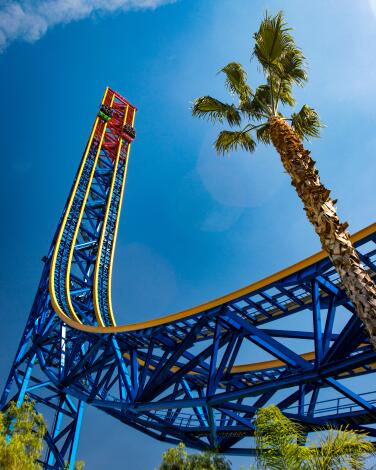
9. Superman: Escape from Krypton
The track runs flat for 600 feet, and then it’s straight up. Superman remains one of the tallest coasters on the planet, rocketing guests up about 40 stories in the air. We hover, and then it’s straight down at 92 mph. The ride, which dates to 1997, was refurbished in 2011 and added the ability to careen along its 415-foot-high track backward. While backward is largely considered the superior way to experience the attraction, at the time of writing the attraction is currently running only forward.
Thompson admits it’s seemingly simple, but reaching 100 mph was at the time a technological landmark, and it still creates effective thrills.
“It was the world’s first 100-mph coaster, the world’s first 400-foot-tall coaster,” Thompson says. “These days, there’s others that have eclipsed it at other parks. It was one of the first magnetic launches, and going up that 400-foot tower, that’s about a solid five seconds of weightlessness. That’s a very unique experience that you can’t get other places. It’s one of the most iconic rides at Magic Mountain. You can see it for miles, and every time it runs the whole park can hear it.”
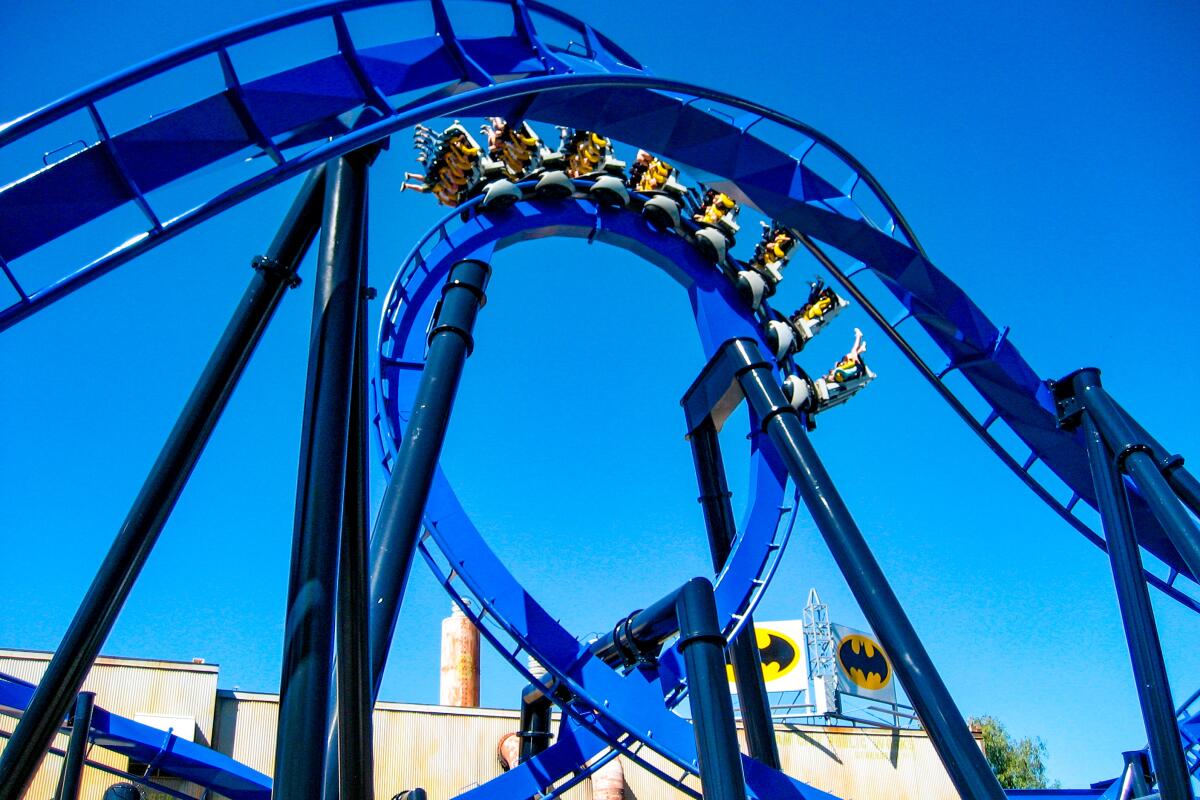
10. Batman: The Ride
It’s still a sight to see at Magic Mountain, its blue track drawing guests in from a distance. Take a photo with a Batmobile, and then wind through an industrial queue that is essentially leading us into the Batcave. The actual ride, which lasts under two minutes, is relatively elegant, boasting an introductory 10-story lift that leads straight into a 360-degree loop. From there, the 50-mph ride twists through multiple descending corkscrews, with a goal of creating a sensation of being swept through the air.
“It was a big deal when it opened, being the first [Bolliger & Mabillard] inverted coaster here in Southern California,” Thompson says. “B&M is kind of the Mercedes-Benz of roller coaster manufacturers. It’s not a super tall ride. It can get a little lost amid the super tall rides that have opened since, but it has one of the best queues of any ride here and it’s an all-around solid ride.”
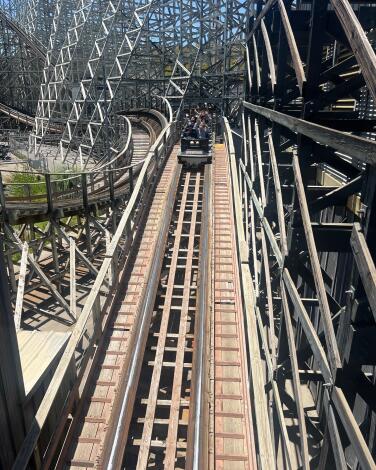
11. Apocalypse
The 55-mph coaster is a looker. We glide through ominous wooden structures, and in and out of tunnels, and there’s plenty of airtime. It’s worth noting, Thompson says, that Apocalypse was built by Great Coasters International, which he cites as “some of the best wooden coaster builders in the business.” That said, after an impressive midsection. Apocalypse’s final section relies heavily on banked turns.
Thus, as far as SoCal wooden coasters go, Thompson says this doesn’t quite reach the heights of GhostRider at Knott’s Berry Farm, a ride that with its 14 hills never lets up. But it does have some clever design. Just be prepared for a potentially rickety experience.
“The way it rushes through some of the tunnels in the middle is a really exciting sequence,” Thompson says. “It does a station fly-through, so if you’re waiting in the station that gets you excited for the ride to come.”
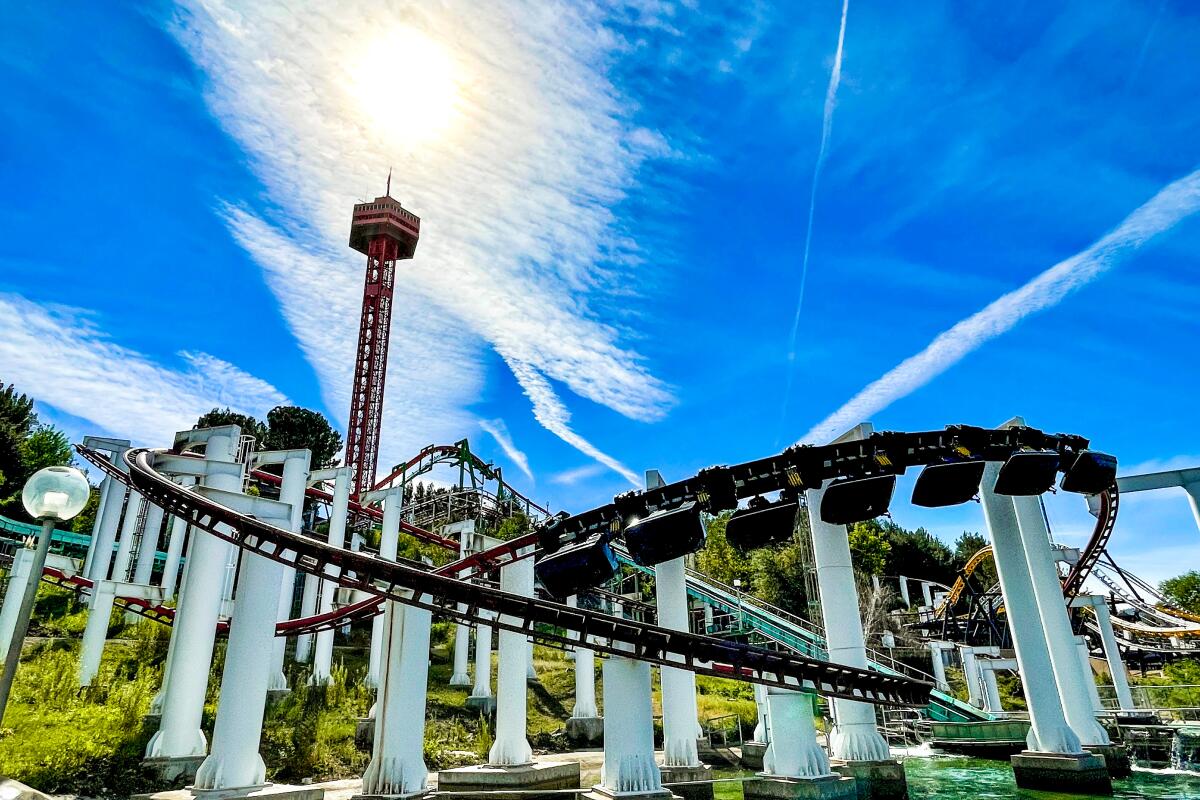
12. Ninja
Ninja is set among one of Magic Mountain’s more hilly terrains, and it attempts to closely hug the environment. Throughout, riders may swing up to 180 degrees, and near its launch, we experience an 85-foot plummet before segueing into a spiral. It then follows a largely circuitous path with another steep drop before reaching its conclusion. Our roller coaster expert called Ninja a “family ride,” but I wouldn’t go that far, as its dips can feel even more drastic than they are when the track is above us.
“I think it’s a great, long, leisurely trip along the mountainside,” Thompson says, clearly having a different definition of “leisure” than I do.
As far as its rarity, Thompson says engineering and safety standards have changed over the decades, and “no manufacturer” wants to take on a swinging, suspended coaster these days. “It’s from a different time period that you couldn’t recreate today,” he says.
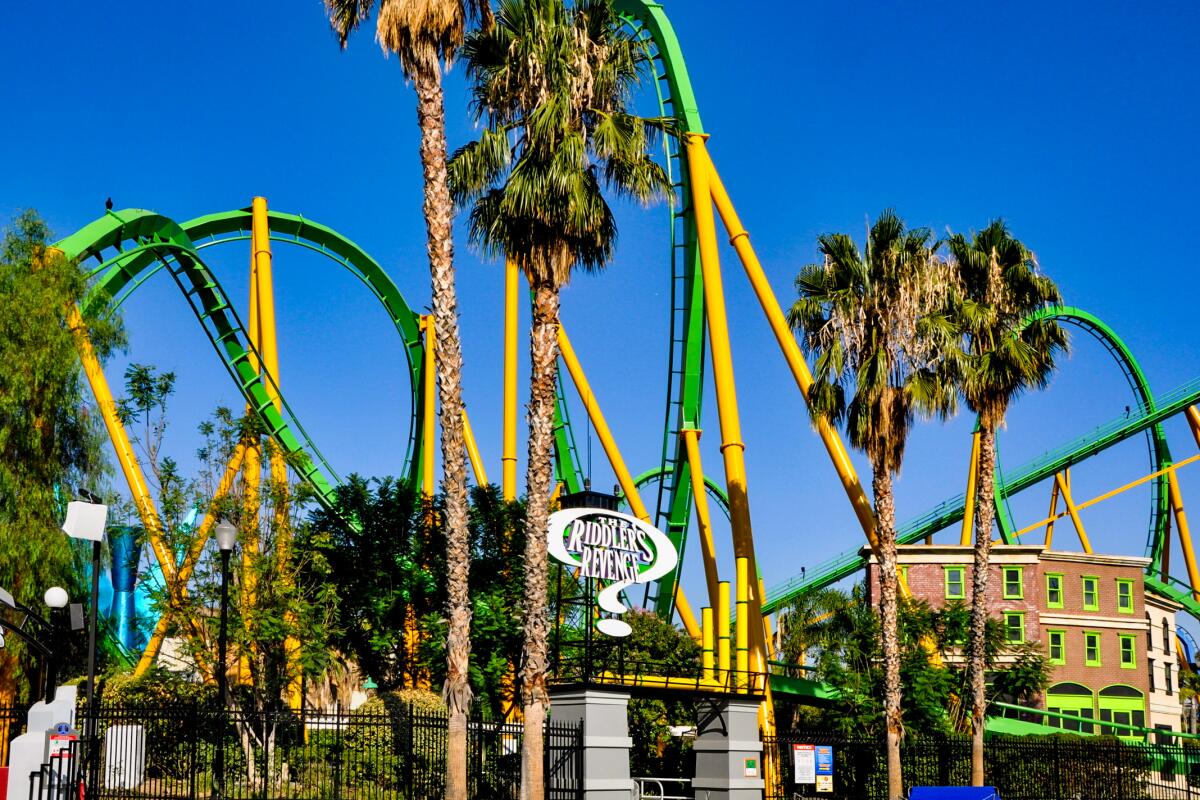
13. The Riddler's Revenge
Oh, did I mention it’s a stand-up coaster?
“When you’re riding in the stand-up position, it’s a very vulnerable position,” Thompson says. “You’re much more exposed to G-forces and changes in direction. A lot of parks have converted their stand-up coasters into floorless coasters, as they can be more comfortable.”
I confess that at 6-feet-2, I had a hard time getting in Riddler’s Revenge and don’t find the stand-up setup to be perhaps as accommodating as a ride at a major park should be. But at 65 mph, Riddler’s Revenge set a number of records when it was built, becoming at the time the world’s longest, tallest and fastest stand-up coaster. It is essentially a collection of loops and inversions and winding corkscrews. At about three minutes, it’s also a relatively long experience.
“It’s the third longest coaster in Magic Mountain,” Thompson says, “so it’s a nice, very complete ride.”
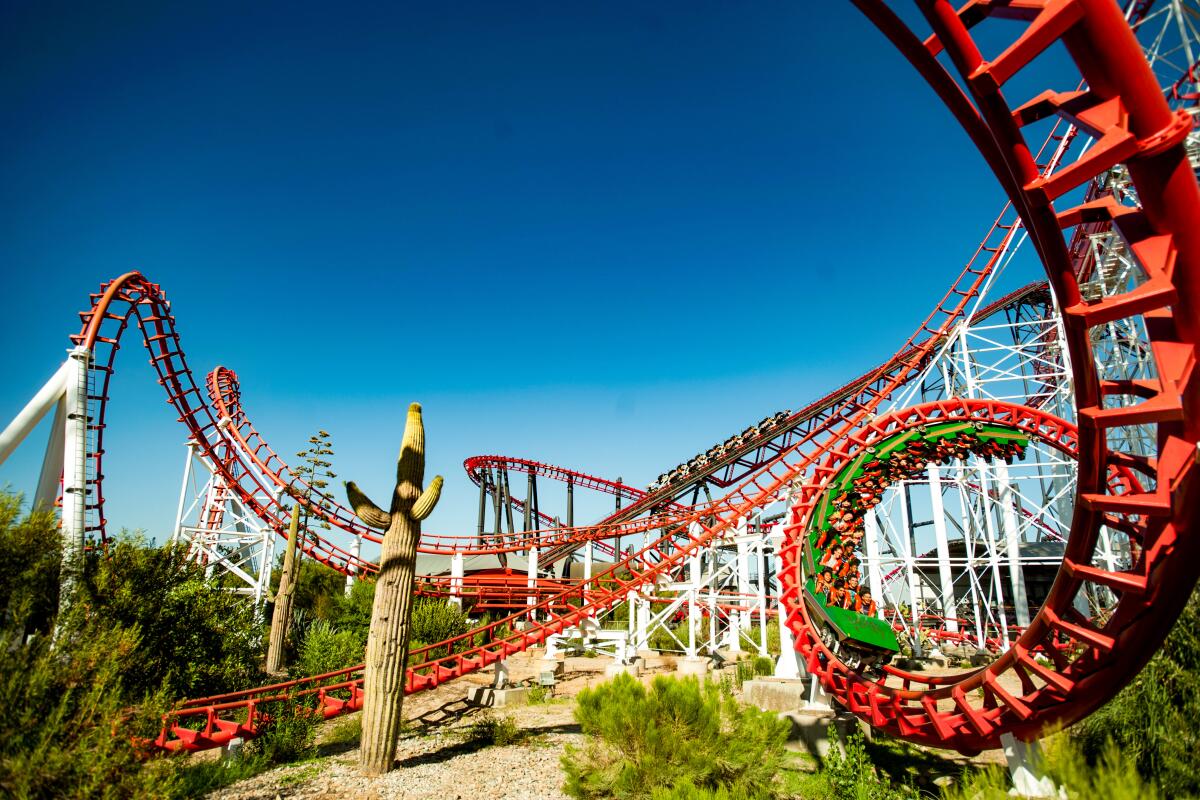
14. Viper
At about 35 years old, Thompson says Viper holds a nostalgic appeal. “Growing up in the ’90s, Viper was the star of the park,” Thompson says. “It’s the last of the major seven-looping Arrow Dynamics coasters, so I respect it for that. They had built three or four of them, and this is the last remaining. I hope that it can stick around.”
But those who aim to brave its initial 171-foot drop and bonanza of loops should be aware that Viper may lack the sleekness of some of the park’s more recent offerings.
“A word of warning,” Thompson says. “It can be a little rough at times. It does have old-style horse-collar restraints. Some of those turns may catch you off guard and you’ll be shuffling around a little bit. But if you appreciate old-school rides, it’s a massive ride and usually there’s not too much of a wait for it. So I do cherish it.”
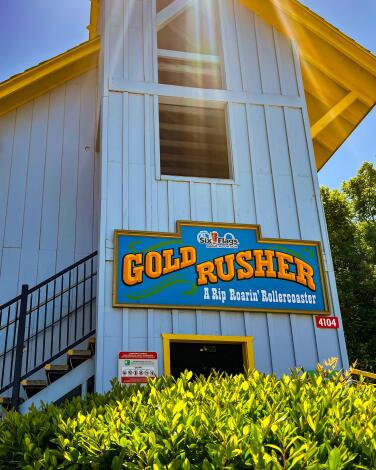
15. Gold Rusher
For early Magic Mountain guests, Gold Rusher was a statement piece. “The breathtaking Gold Rusher roller coaster, was, for instance, custom-designed to snake and slither its runaway route through the hills and the arroyos native to the landscape,” The Times wrote in a 1975 piece that praised the park’s early thrill rides.
Today, that landscape doesn’t feel as manicured, as Magic Mountain has been built up with so many coasters that the green space around Gold Rusher has been heavily trimmed. But it still features moderate, more family-friendly thrills and a 2,590-foot course that hugs the park’s hills and slopes.
“It hasn’t aged quite as gracefully as some of the other coasters,” Thompson says. “A mine train, you really want to feel like you’re going through the woods and through the tunnels, but with Superman and Full Throttle being built on top of it, it kind of loses some of that feeling. I wouldn’t say it’s one of the better mine train coasters out there, but as a 1971 original, it’s cool that it exists at all.”
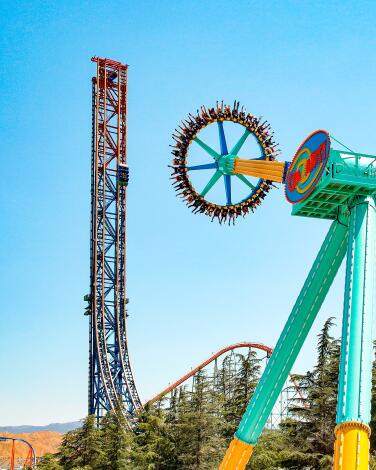
16. CraZanity
CraZanity does but one thing, and it won’t be for everyone — that is, anyone, essentially, with a fear of heights — but it showed that if Magic Mountain is going to build a giant metronome, it will in fact be a mammoth creation.
“It fills a niche that the park was missing, in terms of a giant, high-thrill flat ride,” Thompson says. “It is low capacity. It is kind of repetitive. Six Flags is known for its coasters, and CraZanity doesn’t change that, but it filled a need in the park’s lineup.”
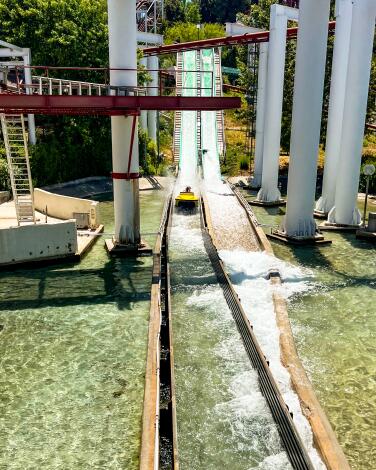
17. Jet Stream
We’re spoiled in Southern California with a number of themed water attractions with mighty drops, but Jet Stream asks us to appreciate its vintage charm.
“Having a classic water ride like this is pretty essential to the park,” Thompson says. “It was their attempt to create a faster-paced whitewater log flume, and when you come down that drop, you kind of hydrofoil across the bottom.”
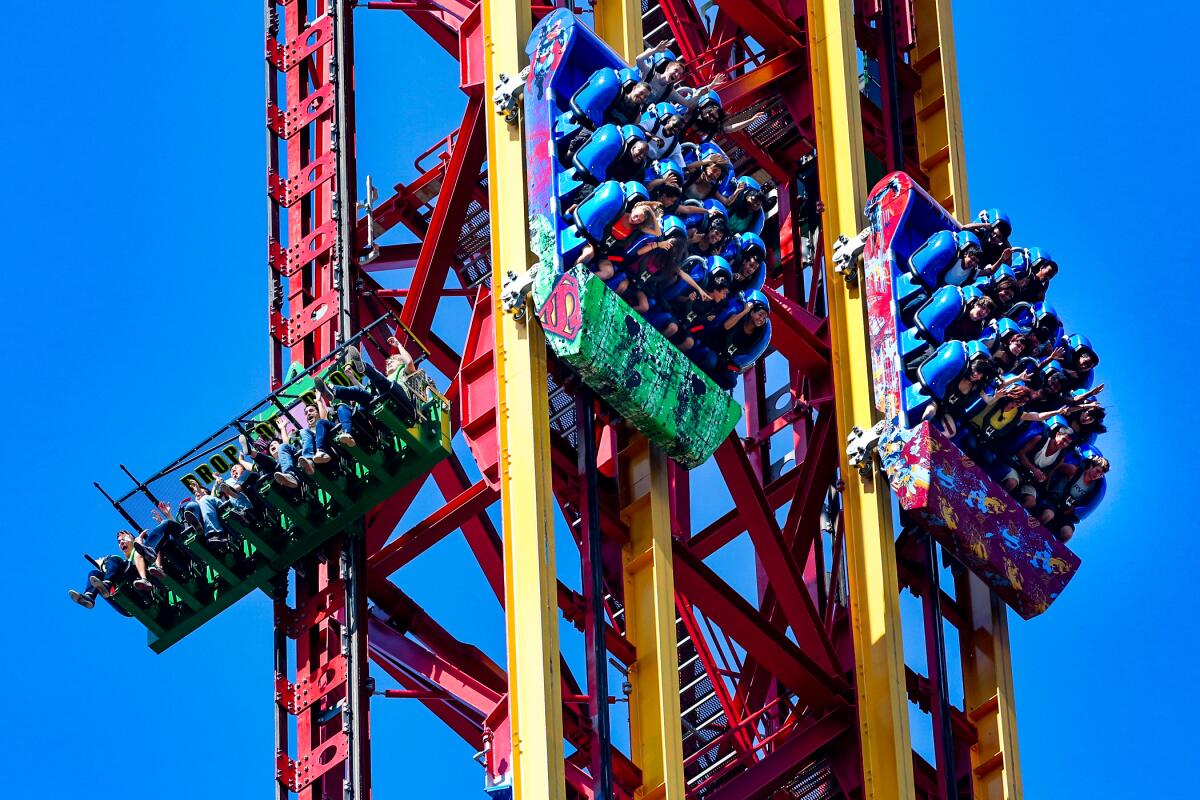
18. Lex Luthor: Drop of Doom
Drop towers, however, are not for everyone. A coaster, even at its most thrilling, provides adrenaline and speed — the rushing sensation that we’re at least traversing a carefully designed track. A pure plummet can be a different kind of terror.
And yet Drop of Doom has a twist no other drop tower can match. If the timing works out and the ride is moving in sync with the Superman attraction, expect some added thrills.
As The Times wrote in its initial 2012 review of Drop of Doom, “If you’re lucky and the timing is just right, the twin Superman trains will rocket out of the coaster station below at 100 mph just as the dual Lex Luthor gondolas reach the top of the tower. And that’s when the shaking starts. The gondola seats rumble violently as the coaster climbs the track. ... It feels like an earthquake in a skyscraper — only you’re strapped to the outside of the building.”
If all of that sounds like a good time, Lex Luthor will be significantly higher on your list of favorite Magic Mountain attractions.
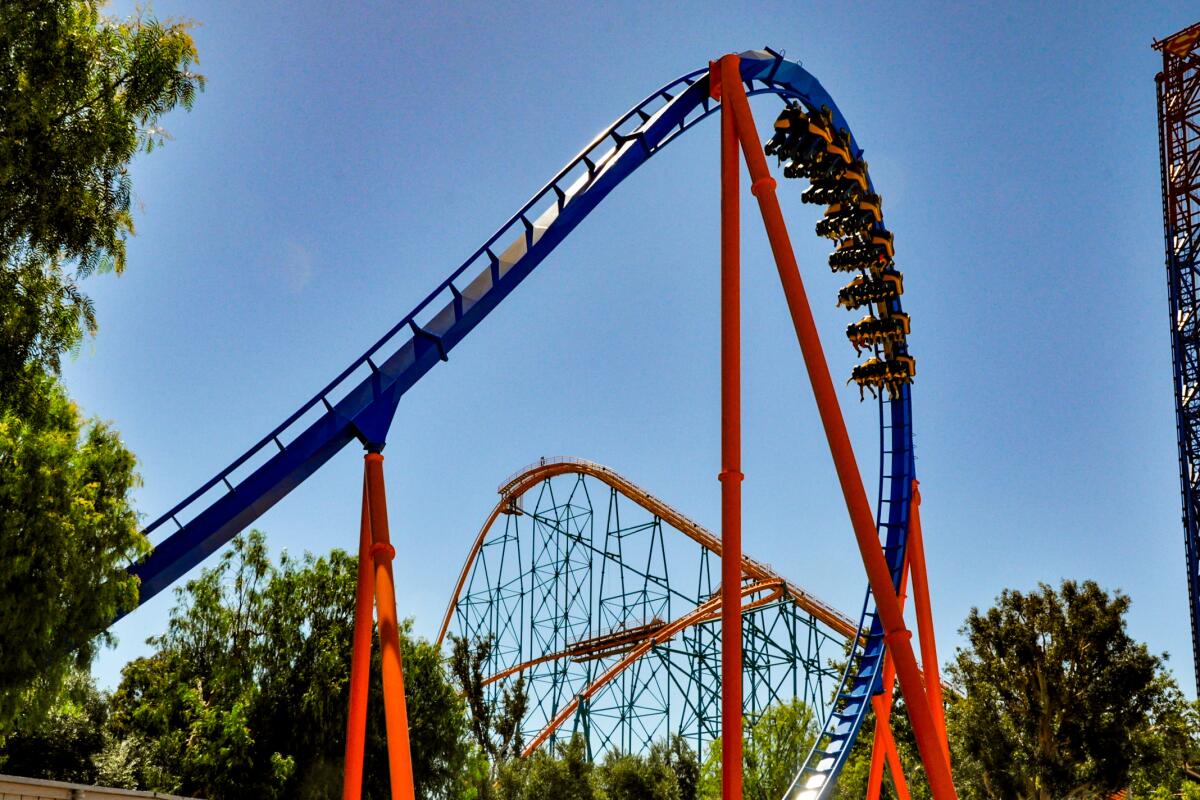
19. Scream
Built over a parking lot, the setting, argues Thompson, hurts Scream. While the coaster wants us to feel as if we are flying, we are simply careening, rolling and soaring above a concrete slab. But need a coaster, especially one that provides airtime and a pair of low-to-the-ground corkscrews, be pretty?
“If this were in any other Six Flags park in the chain, it would be one of the top rides. But here, there are just so many other coasters.”
And with so much competition, looks do, in fact, matter — at least a little.
“Everything this one does, there are other coasters that do it better,” Thompson continues. “And you can still see the stripes on the pavement that they built on top of. They never bothered to do any painting or landscaping.”
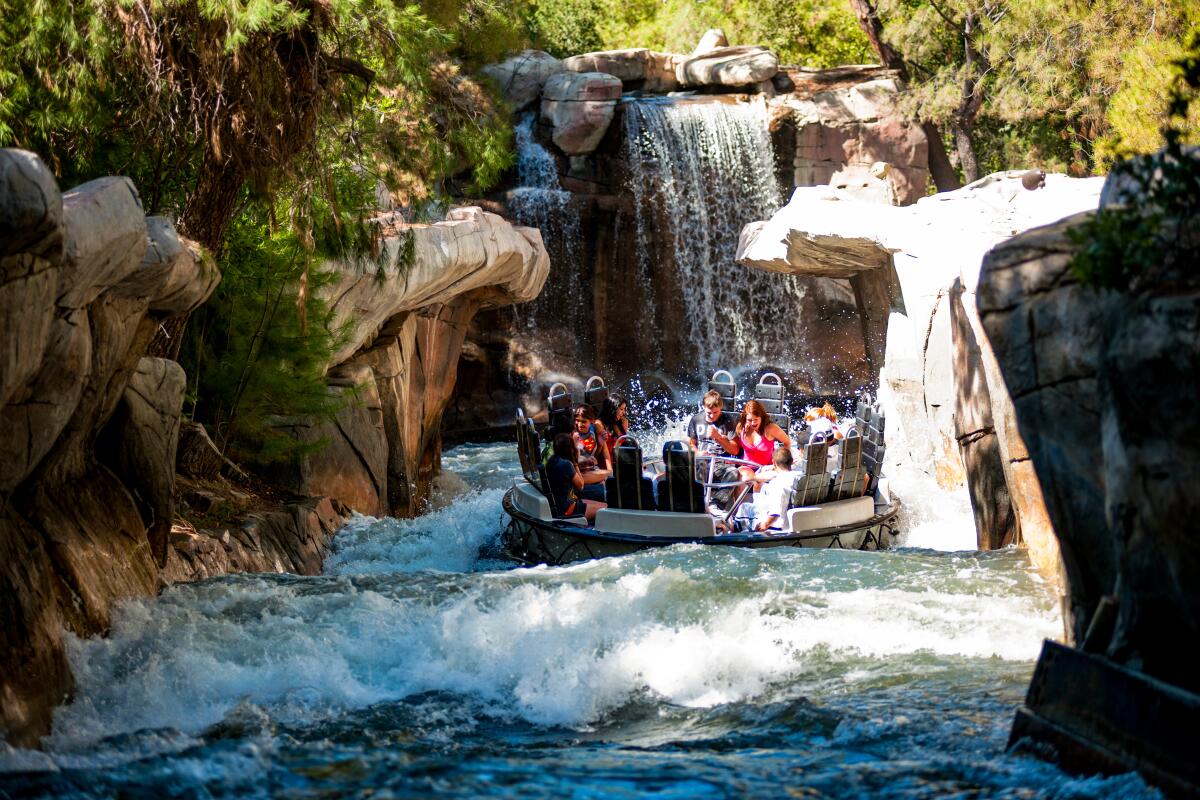
20. Roaring Rapids
The rapids concept was one that initiated with Six Flags, as the first whitewater-type ride in American is traced to the defunct Texas park Astroworld in 1980. Magic Mountain’s take followed a year later. Astroworld’s owners were inspired by an artificial river course designed for the 1972 Munich Olympics, and Magic Mountan’s edition features a relatively shallow 1,200-foot-long riverbed with rafts that can move about 30 mph among artificial canyon walls designed to resemble rocks and boulders. But shallow, of course, doesn’t mean this ride isn’t aggressive.
The turbulent river, buoyed by narrow chutes, like all rapids rides moves in an unpredictable fashion. Expect about four big crushes of water to leap into the raft, and those waves will be massive — there’s no build-up, no pacing and no underlying storyline. To ride Roaring Rapids is to sign up to be soaked.
No other ride in Southern California will get you as wet, and the raft will likely be full of about 4 or 5 inches of water by ride’s end. Be warned. The shoes I wore to Magic Mountain were out of commission for more than 24 hours. Advancement in amusement technology means more modern rapids rides tend to vary the waves and the tension, but there’s nothing fancy, other than torrential water, about Roaring Rapids.
Sign up for The Wild
We’ll help you find the best places to hike, bike and run, as well as the perfect silent spots for meditation and yoga.
You may occasionally receive promotional content from the Los Angeles Times.




